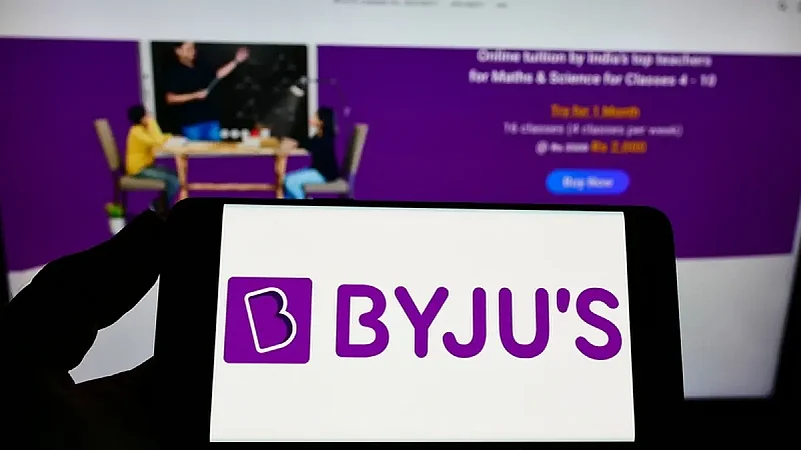In a recent turn of events in Byju’s never-ending saga, the US lenders recently disputed Byju Raveendran’s claim last week on the company's verified debt to them being merely Rs 20 crore as per the insolvency proceedings.
Glas Trust, which represents the US consortium of lenders, have stated that the embattled ed-tech firm would have to cough up the entire $1.2bn Term B Loan with interest.
The financial trouble of the once most-valued Indian ed-tech start-up began after US-based lenders filed a lawsuit against the ed-tech firm to recover $1.2bn Term Loan B in June 2023.
Byju’s secured Term Loan B in November 2021 to propel its global expansion and growth strategy. For the uninitiated, Term Loan Bs are acquired by companies to get large amounts of capital with more flexible terms and maturities.
Notwithstanding that, in August, following a plea filed by Glas Trust, the Supreme Court had stayed the National Company Law Appellate Tribunal's (NCLAT) approval of the settlement between Byju’s and the Board of Control for Cricket in India (BCCI) over sponsorship dues amounting to Rs 158 crore.
NCLAT’s approval quashed the insolvency proceedings that was initiated against it by the BCCI.
The Supreme Court will reportedly hear the plea on September 17.
With Byju's in a state of turmoil, what does the future hold for the ed-tech firms in the country?
Byju’s, Ed-tech and India’s Education System
India's education system is highly flawed. The government-run schools and colleges, which serve a large portion of the population, suffer from inadequate infrastructure.
India’s public expenditure on education as a percentage of GDP has been around 3 per cent for several years, which is lower compared to many other countries with robust education systems. According to the Ministry of Education’s report in 2022, over 60 per cent of government schools still face teacher shortages, impacting the quality of education and student-teacher ratios.
Additionally, the outdated syllabus and curriculum fail to equip students with the skills required to meet the demands of the modern world. Moreover, there's also a significant shortage of adequately qualified teachers.
Ed-tech platforms like Byju's, Unacademy etc. initially aimed to address these challenges and, to a large extent, found success in doing so. They democratised the education system by offering flagship courses that could only have been afforded by the well-to-do in the Indian society. Right from K-12 Segment to UPSC preparation, all these ed-tech platforms were able to offer courses at a very convenient rate and means to the general masses.
India is reportedly home to around 400 ed-tech start-ups including the likes of Byju’s, Upgrad, Eruditis, Vedantu and Physics Wallah. Their big break came when Covid-19 made the world come to a standstill with many schools, colleges and educational institutions getting closed. During the pandemic, with every sphere of life becoming online, there was an increased proliferation of internet connection along with mobile phones and laptops. Students resorted to the online mode of education and adapted to it quickly.
The number of users on these platforms substantially increased over the course of the pandemic years. For example, Byju’s users reportedly increased from 20mn to 40mn within a span of four months. The growth trajectory that happened during the pandemic for Byju’s would have taken years to achieve for any ed-tech firm. Platforms like Toppr and Unacademy were able to achieve similar feats.
But things started to go haywire for many of the ed-tech firms as the pandemic receded and demand for online education came down with many preferring offline classes.
Like many ed-tech firms, Byju’s revenue began to falter with the consolidated revenues jumping to Rs 8,245 crore in FY22, almost double the amount from Rs 4,564 crore in FY21.
A similar trend was also observed with Unacademy as it experienced notable financial challenges. In FY23, Unacademy reported a loss of approximately Rs 2,800 crore. Toppr reported a loss of approximately Rs 458 crore.
Byju's struggled to pay off the loans that it had gathered from the US-based lenders. It also reportedly led to over 10,000 being laid off over the past two years. The company faced severe cash crunch, pay cuts and defaults on investor’s payments leading the firm to a precarious situation.
What’s Next for Ed-tech in the Country?
As per Blume Ventures, India is the second largest market for e-learning after the US and is expected to grow to $10.5mn by 2025.
It is believed that investors would be very sceptical when it comes to investing in the ed-tech firm after the whole Byju's conundrum. However, experts believe contrary to the prevailing claims.
Anil Nagar, co-founder and CEO of Adda247, a local language learning platform backed by Google and Westbridge Capital told Outlook Business earlier, "Some business models were flawed and received funding, leading everyone to believe these were the right models."
Despite Byju’s faltering, Nagar feels that the online mode of education is here to stay and some companies would emerge as major online education providers in India.
Nagar believes that things will get better and normalised as education is a big market in India and a big problem to solve.
While there is uncertainty about the revival of the ed-tech sector, there have been venture capitalists who have shown interest in the sector.
One of the emerging ed-tech firms in the country, PhysicsWallah, in August, was set to raise $150mn taking the company’s valuation to $2.8bn.
As per KPMG, the ed-tech sector, with roughly 18.55mn paid users across K-12, test preparation and skill development, is estimated to go up to 120mn by 2030.






























